#delle alli
Explore tagged Tumblr posts
Text
⚢ 2023 ⚢

Elena & Amanda
-⚢-

Courtney & Allie
-⚢-

Candace & Anna
-⚢-

Chelsea & Tipesa
-⚢-

Sue & Megan
-⚢-

Breanna & Marta
-⚢-

Jonquel & Nesha
-⚢-

Dewanna & Alyssa
-⚢-

Diana & Penny
-⚢-
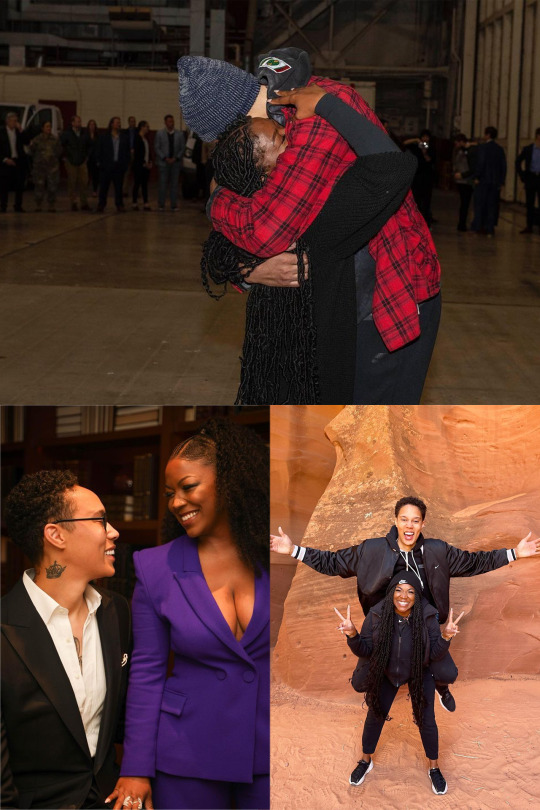
Brittney & Cherelle
-⚢-
(2022) (2024)
#happy lesbian day#wnba#elena delle donne#courtney vandersloot#allie quigley#candace parker#chelsea gray#sue bird#megan rapinoe#breanna stewart#jonquel jones#dewanna bonner#alyssa thomas#diana taurasi#penny taylor#brittney griner#ldov
193 notes
·
View notes
Note
I Inquire!!! Potatoes or... human flesh?
"POTATOES."
"HUMAN FLESH, IN ITS STRINGY, BLOODY, VISCERA, IS NOTHING BUT GARBAGE. I DESPISE IT, AND ALL OF THOSE WHO BEAR IT."
#sory if this is a reference#my brain lags like a 2005 dell computer#am ihnmaims#ihnmaims#ask am#ask the allied mastercomputer#ihnmaims ask blog#ask blog#potatOS lament?
7 notes
·
View notes
Text

𝕡𝕙𝕒𝕟𝕥𝕠𝕞 𝕡𝕒𝕚𝕟𝕤
(More art for the story arc between @emotionally-composed-spy , @emotionally-enervated-conagher , and @emotionally-clumsy-soldier ;})
-
2 different versions & the original uvu



#tw eyestrain#tw blood#blood#eyestrain#HEHEHE >:]#this was kinda meant for before Dell made up with the other two n the motel but#still wanted to finish it hehe ;]#dell’s goin through it ehe#tf2#tf2 engineer#engineer tf2#tf2 soldier#soldier tf2#tf2 spy#spy tf2#team fortress 2#war allies#engineer x spy x soldier#dell conagher#technicalgator art#an old debt#tf2 au
47 notes
·
View notes
Text

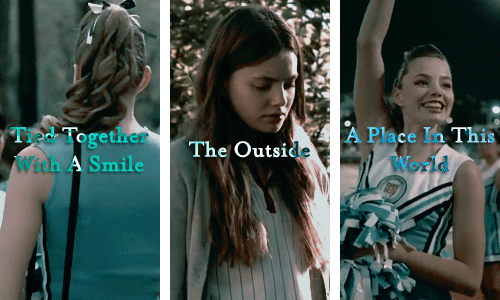




Gilmore Girls OCs ✤ Taylor Swift Albums (x)
Debut: Willow Dell Fearless: Allie St James Speak Now: Sophie Dugray
Tag List: want to be added?
#ocappreciation#allaboutocs#gilmores x era#gilmore girls oc#willow dell#the road not taken#allie st james#allie x jess#the mad ones#jallie#ship: we looked at each other a little too long to be just friends#sophie dugray#tarnished gold#sophie x rory#sophie x logan#ship: girl we're what matters now#ship: they'll hang us in the louvre#my work#my edits#my gifs#my ocs
10 notes
·
View notes
Text
Paradise Planning Facilities…..3!










1 note
·
View note
Text
TRANS DAY OF REMEMBRANCE 2024
Don't have the spoons to make a spiel about how solidarity in and out of the community is important, but wanting to highlight that as is. We need to speak out and show up for those who fight alongside us, and for those we've lost*.
*Remember: Any concrete numbers you see statistics wise are not 100% accurate. The violence against us, especially our BIPOC siblings, are majorly under-reported.
Here are some organizations and resources to share around, with attributions and pronouns (as of writing the post). I'll section this off based on what type of resource/org they are... more or less--
Archival.
2600 Pages of Hate: Transphobia and Fascism by maia crimew (It/She)
Black Trans* Oral History Project by Blu Bachanan (They/Them) and Naomi Simmons-Thorne (She/They)
Digital Transgender Archive by K.J. Rawson (He/Him) et al.
LGBT+ Intersectionality, a Google Drive full of Resource Books
The Mirror Memoirs by Amita Swadhin (They/Them), Jaden Cervantes-Fields (He/Him), and Bilen Berhanu (She/Her)
NYC Trans* Oral History Project
The Trans* Library (Carrd)
University of Victoria Transgender Archives (Canada)
Varied.
Baltimore Safe Haven, established by Iya Dammons (She/They).
Bklyn Boihood, established by Black masculine-of-center queer and trans people of color.
Black Trans Femmes in the Arts, established by Jordyn Jay (She/Her)
Black Trans* Travel Fund, established by Devin Michael Lowe (He/They) and Morticia Godiva (Her/Shey)
Brave Space Alliance, established by trans and gender non-conforming individuals.
FedUp Collective, established by Zain Lugay (They/He), Sam (They/Them), Cody (He/Him), Ian (He/Him), JO Walduck (She/They), et al.
For the Gworls, established by Asanni Armon (They/Them; Sources Vary)
The Gender Affirming Letter Access Project, established by transgender, nonbinary, and allied mental health and medical providers.
"The Gender Binary" is a Misnomer; Gender Has Always Been a Hierarchy by Talia Bhatt (She/Fae)
Privilege, Power, and Pride: Intersectionality within the LGBT Community by Kittu Pannu (He/Him)
The Okra Project, established by Gabrielle Inès Souza, Max Rigano, and Celyna Jackson (Pronouns Unknown).
Organización Latina Trans in Texas, , established by Anandrea Molina (Ella/She, Rigoberto Reyes/Monika Adams (Él/Ella/She/He), Gia Pacheco (She/Ella), Danny Lopez (Él/He), Noemi Garza, Barby Ledesma, Vanessa Garcia, and Kassandra Rivas (Pronouns Unknown).
Princess Janae Place, established by Jevon Martin (He/Him) and Dani Farrell (He/They).
The Transgender Education Network of Texas, established by various BIPOC trans community members.
Trans*, Gender Variant, and Intersex Justice Project, established by Janetta Johnson (She/Her), zy'aire nassirah (He/Him), zen "zee" mills (She/Her), van dell (They/Them), Valentine McClain (They/She), eli b. (They/He), et al.
TransgenderNI (Northern Ireland) / Belfast Trans Resource Centre, established by trans community members.
TransInclusiveGroup, established by Tatiana Williams (She/Her/Goddess), Krys Gordon (She/Her), Adrianna Tender (She/Her/Diva), Mei-Lan Diaz (They/Them), and Na'stacia Buchanan (She/Her).
Trans Latin@ Coalition, established by Paolo Coots (She/Her/Ella), Arianna Inurritegui-Lint (She/Her/Ella), Alexa Rodriguez (She/Her/Ella), et al.
Trans* Needle Exchange, established by Oliver (Pronouns Unknown).
And remember, community is what keeps us alive.
It is important to call out bigotry in our spaces; important to let those here know we value them and their existence. Do not solely fight for those who are gone, fight for those who are living with us here and now.
Let the folks in your lives and in your communities know you care about them. Listen to them. Learn from them. None of us are free until all of us are free.
Which is why I'm also going to drop broader-focus organizations and resources for the global community:
alQaws for Sexual & Gender Diversity in Palestinian Society
Canadian LGBTQ+ History
India's LGBTQ+ Movement
LGBTQ+: A Troubled History in Mexico
LGBTQ+ Orthodox Jewish Education (PDF)
LGBTQ+ Narratives in Pakistan
LGBTQ+ Rights Ghana Support Fund
Nigeria's Queer History
Queer Activism in Africa
Queer Nigerian Emergency Fund
Feel free to add onto this (preferably with more grassroots kinda stuff/individual spotlights; anything goes long as it's vetted really).
47 notes
·
View notes
Text
Chapter V: “Victoria O’Hara Looses Her Fucking Mind. Again!” | Diana Taurasi x OC
Warnings: V is loosing her shit (one more time) and Diana being the menace she is, and barely noticeable alcohol consumption
A/N: honestly guys I think I ate this time, with all due respect I fucking love this chapter that’s it. I know I said this would be out last week but I’m a struggling college student and I wanted this chapter to be extra fucking perfect, I just hope you guys love it like I do. Per usual you already know the drill, English is not my first language so yeah just lmk if my dumbass self screwed somewhere so I can change it and not embarrass myself, likes reblogs and comments(!!!) are highly appreciated and my ask box is always open for whatever you want to tell me. With nothing more to say, enjoy. Love Sof :))
Making headlines masterlist

“From Enemies to Allies? The All-Star Weekend Just Got a Lot More Interesting with O’Hara and Taurasi Both On Team Delle Donne!”
I hated her. And I wanted her. And I didn’t know which feeling was stronger.
I hated it.
She was going to be on my side, and I hated it. But I hated more the fact that she was the only thing clouding my mind right now. I just made the All-Star team, and my thoughts went straight to her.
Her words, her voice, her talent, her body, her hands, her lips, her hips—
Stop. It. Right. There.
I shook my head as I stepped onto the court, the noise of the crowd surrounding me, but it felt muted in comparison to the chaos inside my mind. Diana Taurasi was a living legend, and now I had to play alongside her. I had spent months battling against her on the court, and now she was going to be my teammate.
Great. Just what I needed.
As the game began, I focused on my breathing, trying to block out the fact that she was always right beside me, moving with that effortless grace that had everyone talking. The first few minutes were a blur of adrenaline and deafening cheers, the thrill of the crowd igniting a fire in me. I was quick on my feet, executing plays and sinking shots. But every time I caught a glimpse of Diana out of the corner of my eye, a rush of irritation mixed with something dangerously close to desire surged through me.
“Nice pass!” she called out after I made an assist, and my heart raced, my body responding to her enthusiasm despite my annoyance. I shot her a glare, determined to keep my focus. “Shut your mouth and focus on the game, Taurasi.”
She chuckled, that infuriating laugh that somehow sent butterflies through me. “Just saying, kid. You might actually be useful.”
As the game wore on, we fell into a rhythm. The crowd erupted every time we executed a play, the energy lifting me higher with each basket. But every time Diana scored or made a defensive stop, I could feel the heat radiating from her, and it made my competitive spirit flare. I hated that I was so drawn to her.
I was that stupid moth who crashed against the glass of the lighting bulb.
By the end of the first half, we were in the lead, and I was feeling pretty good about myself. But as we huddled together, I could feel her presence just behind me, an electric charge that made it hard to concentrate on the coach’s strategy. I forced myself to focus on the game plan, but all I could think about was how close she was, how I could feel the warmth radiating off her.
After the final buzzer sounded, signaling our victory, the cheers of the crowd washed over me like a tidal wave. But before I could relish the win, I turned to find Diana standing right there, a triumphant grin plastered across her face. “See? Not so bad playing with me, huh?”
“Don’t push it,” I shot back, unable to hide the smirk threatening to break through.
She stepped closer, her eyes sparkling with mischief. “What’s wrong baby?”
My arms fell, as I walked to be just beside her, my lips close to her ear, my heart racing for reasons I refused to acknowledge. “I said don’t fucking push it”
“Star Power: O’Hara and Taurasi Prove They’re a Force to Be Reckoned With”
With that, we made our way to the after-party, the tension sizzling between us like a live wire. The place was packed, music blasting and lights flashing in every direction. I grabbed a drink, needing something to cool the heat rising in my cheeks from our earlier banter. But as the night wore on, and the small talk with people who I didn’t really care about, but for some reason they cared about me turned poisoned, I couldn’t shake the feeling of her presence. It was intoxicating and maddening all at once.
The atmosphere was full with excitement, laughter spilling from all corners of the room. I tried to drown out the noise, but every beat of the music seemed to pulse in time with my heart, and every glance in Diana’s direction sent a rush of heat through me.
I caught her across the room, chatting animatedly with some teammates, her laughter cutting through the crowd like a siren call. I tried to focus on my drink, but my eyes kept drifting back to her. The way she moved, the way she commanded attention, it was infuriating and captivating at the same time. I hated that she could pull me in like this.
“Earth to Victoria!” a A’ja nudged me, pulling me from my thoughts. “Girl you good? You’ve been staring at Taurasi like she’s about to jump off a cliff.”
“Shut up,” I replied, rolling my eyes even as I felt the heat creeping up my neck. “I’m just… observing.”
“Observing, huh? Is that how we calling that this days? You’ve got that look, like you’re about to take her out or something.”
“More like I want to beat the shit out of her” I shot back, forcing a laugh that didn’t quite reach my eyes.
But the truth was, I was feeling anything but hostile. The tension was thick in the air, and I could sense Diana moving closer, the hum of energy sparking between us like static electricity. She was a force of nature, and I hated that I wanted to get swept up in it.
I made my way through the crowd, drink in hand, hoping to find a quieter corner. I stood on a secluded part of the place, the music now muffled for the walls that separated me from the chaotic mess inside, but somehow, it was peaceful, well as peaceful as you could be in a party, that was until I felt a presence behind me.
I didn’t even had to look back, my head just hung low knowing exactly who was there.
“You’re really not going to let this go, are you?” I asked, trying to keep my tone light, even though my heart raced.
She looked at me, eyes glinting with mischief. “Let what go? The fact that we actually make a pretty good team? Or the fact that you’re secretly obsessed with me?”
“Fuck. Off.” I shot back, crossing my arms. “You know what? Every time you speak I actually consider throwing you into the nearest wall.”
“Is that a threat or a promise?” she replied, stepping closer, the air crackling between us.
I narrowed my eyes, refusing to back down. “I don’t think you really want to find out.”
“Why not? It could be fun,” she challenged, her voice low, enticing.
I felt my resolve slipping, drawn to her in a way that made my skin prickle with awareness. We were standing too close, the heat of her body igniting something deep within me.
Suddenly, the playful banter shifted, and I was acutely aware of every inch between us. “You’re fucking impossible,” I whispered, my breath catching in my throat.
“And you hate that you love it,” she shot back, her gaze steady, daring me to disagree.
I found myself leaning closer, caught in her magnetic pull. I couldn’t help it; the tension had become unbearable.
“Is this how you deal with the girls that make you feel threatened Taurasi?” I breathed, my heart racing.
“Only the ones that are pretty” she replied, her voice low and smooth.
Before I knew what I was doing, I pushed her shoulder lightly, my frustration boiling over. “How about you stop acting like a bitch who own the fucking place,” I hissed, but the fight was half-hearted.
“Yeah? How about I don’t” she smirked, pushing back against me with just enough force to knock me off balance. “Maybe I’ll own you too.”
I laughed, a sound laced with disbelief and desire. “You really think you’re the shit don’t you?”
Her eyes sparkled with mischief as she took a step closer, her breath mingling with mine. “Why don’t you find out?”
The room faded away as I stared into her eyes, the challenge hanging heavy between us.
And. I. Leaned. In.
I leaned in!!! Can you fucking believe that????
And suddenly we were kissing
It was raw and heated, our lips crashing together in a mix of frustration and longing.
It was reckless and intoxicating, and I hated how much I craved her. My hands found their way to her waist, pulling her closer as she deepened the kiss, her fingers threading through my hair.
When we finally pulled apart, breathless and wide-eyed, I felt a mix of triumph and disbelief. “What the fuck Taurasi” I whispered, half-laughing, half-stunned.
Diana smirked, the challenge still burning in her gaze. “I really think you know what the fuck O’Hara”
And just like that, she left, but now there was an undercurrent of something deeper, a connection I hadn’t expected but couldn’t ignore. I hated that I was drawn to her, that the fire between us was undeniable. But maybe, just maybe, this was a battle I was finally willing to lose.
Wait did I really said that?
"What the Hell Just Happened? Why Do Victoria O’Hara Always Ends Up In This Position?"

Requests are Open!
Masterlist
#lesbian#fanfic#diana taurasi#boowrites★#wnba x reader#diana taurasi x reader#wnba basketball#phoenix mercury#diana taurasi x you
46 notes
·
View notes
Note
Re: the palisman thing, I can see a world where the average citizenry of the Isles is wary about carving Palisman (especially if Belos ramped up his collection of them in some way to get his snackies) so Dell + Bat Queen/whoever else Luz’s wild witchery allies are on this subject propose that Luz SHOULD actually carve a Palisman for herself to lead by example and show the Isles that the crusade against wild witchery and its practices are Over.
Also imagining Luz carving an egg again and then having to Sit With It while she tries to speed run figuring out/admitting her greatest wish is to be forgiven and how it NOT hatching in the meanwhile makes her feel like it’s some punishment like “Sorry! You haven’t done enough to earn this yet (False)”
luz carving an egg again because she's like "i'm giving my palisman SOME autonomy, so help me".... 🥺🥺🥺
on the subject of waiting for it to hatch, though -- i think her feelings would be a little more complex than pure self-loathing..... i think a huge part of her would Dread the palisman hatching. for reasons she cannot quite quantify.
(i can imagine hunter being like "why are you worried....? by DEFINITION your palisman is gonna love you" and her being like "hahaha! i guess i have internalized wild magic phobia. let's not examine this")
the reason is that she can't bear to accept unconditional love right now. so in some ways, i think luz's palisman would hatch right when she's finally, truly ready for it to hatch -- because it means she's ready to accept that this constant unhappiness & self-punishment is.... Deeply Pointless.
i DO like the idea of her still getting stringbean, though :) her desire may be a little different from her canon self's, but this luz has Plenty in common with a silly shapeshifter that can adapt to suit a bunch of different circumstances!!
24 notes
·
View notes
Text
The Owl House: The New Year’s Special

Sarah-Nicole Robles
Wendie Malick
Alex Hirsch
Mae Whitman
Tati Gabrielle
Issac Ryan Brown
Zeno Robinson
Elizabeth Grullon
Cissy Jones
Avi Roque
Keston John
Matt Chapman
Michaela Dietz
Grey DeLisle
Erica Lindbeck
Ryan O’Flanagan
Kimberly Brooks
Ally Maki
Kari Wahlgren
Cast:
Princess: DEE BRADLEY BAKER
Gilbert Park & Faust: ERIC BAUZA
Barcus: BOB BERGEN
Professor Hermonculous: J.B. BLANC
Salty: STEVE BLUM
Gus Porter: ISSAC RYAN BROWN
Skara & Eileen: KIMBERLY BROOKS
Mason: BRUCE CAREY
Steve Tholomule & Harvey Park: MATT CHAPMAN
Tibblet-Tibblie Grimm Hammer III “Tibbles”: PARVESH CHEENA
Manny Noceda: WILSON CRUZ
Adrian Graye Vernworth: NOSHIR DALAL
Bria: FELICIA DAY
Tía Valentina Noceda: ARIANA DeBOSE
Prima Gabi Noceda: ELIJAH DeJESUS
Masha, Katya, Cat, Usurper, & Bonesborough Brawl Security Guard: GREY DeLISLE
Matt Tholomule: JORGE DIAZ
Vee Noceda: MICHAELA DIETZ
Gavin: NIK DODANI
Gwendolyn Clawthorne: DEB DOETZER
Osran: JASON DOUGLAS
Willow Park: TATI GABRIELLE
Flora D’splora: EILEEN GALINDO
Dell Clawthorne: PETER GALLAGHER
Jerbo: NOAH GALVIN
Long-Haired Bat Kid: KIMIKO GLENN
Camila Noceda: ELIZABETH GRULLON
Angmar: HARVEY GUILLÉN
Eye-Eating Monster, Snaggleback, & Papa Titan: ARIN HANSON
King Clawthorne & Hooty: ALEX HIRSCH
Mohawk Bat Kid: HOLLY @hollowtones
Bill: CHRIS HOUGHTON
Tío Emilio Noceda: OSCAR ISAAC
Darius Deamonne: KESTON JOHN
Lilith Clawthorne: CISSY JONES
Kikimora: MELA LEE
Vitimir: JASON LIEBRECHT
Emira Blight: ERICA LINDBECK
Braxas: KEVIN LOCARRO
Odalia Blight: RACHAEL MACFARLANE
Viney: ALLY MAKI
Eda Clawthorne: WENDIE MALICK
Morton: SHANNON McKAIN
Olive (Gabi’s Girlfriend): MOSCO MOON
Abuela Luna Noceda: RITA MORENO
Edric Blight: RYAN O’FLANAGAN
Tío Mateo Noceda: JOHNNY ORTIZ
Bucket Hat Bat Kid: PENNY @snapscube PARKER
Alador Blight: JIM PIRRI
Azura: ANAIRIS QUIÑONES
Philip Wittebane/Emperor Belos: MATTHEW RHYS
Tarak, Bonesborough Brawl Commentator, & Tom: KEVIN MICHAEL RICHARDSON
Boscha, Amelia, Bo, & Abominations: EDEN RIEGEL
Hieronymus Bump: BUMPER ROBINSON
Hunter, Derwin, & Male Camp Friend: ZENO ROBINSON
Luz Noceda: SARAH-NICOLE ROBLES
Raine Whispers: AVI ROQUE
Bat Queen: ISABELLA ROSSELINI
Jacob Hopkins & Warden Wrath: ROGER CRAIG SMITH
Female Camp Friend: HAILEE STEINFELD
Greater Basilisk: APRIL STEWART
Graveyard Keeper: CHRISTOPHER SWINDLE
Malphas: FRED TATASCIORE
Hettie Cutburn: JEN TAYLOR
Tinella Nosa & Severine: DANA TERRACE
Hecate & Harper (Gabi’s Other Girlfriend): MORGAN TERRY
Amber, Eberwolf, Villainous Lucy, & Barista: KARI WAHLGREN
Amity Blight: MAE WHITMAN
Perry Porter: GARY ANTHONY WILLIAMS
Terra Snapdragon: DEBRA WILSON
The Collector: FRYDA WOLFF
#the owl house#dana terrace#happy new year#luz noceda#eda clawthorne#king clawthorne#hooty#amity blight#willow park#gus porter#hunter#camila noceda#lilith clawthorne#raine whispers#darius deamonne#steve tholomule#vee noceda#masha#emira blight#edric blight#skara#viney#bards against the throne#eberwolf#lumity#raeda#huntlow#veesha#melodybeast
14 notes
·
View notes
Text
Oggi ho provato Traskribus.
Dovrebbe essere in grado di riconoscere il testo di un manoscritto.
Invece? Ha inventato una nuova lingua. Bellissima.
"Gipegolie mentecone di respponta sur pupriche"
Chiudo con i saluti tipici del Traskribese:
eeee eoeo eei a tutti voi.
Calo Gio °: 5895 Seao Gepertozio essubbblice Ielezzene Gipegolie mentecone di respponta sur pupriche Genileme. De lacco di forgiome di ceree ineine dessenee lle alle cospuzione di cen sivico completa Aondeo Quile. Combenzimi e diligie d'anno mellenoreconbocnquentorette ed alli del 6 del eeere di Selobiaio dei Toreno, grer dcii a flu Coe pole dela cu fan alinuna comere al promosiano delle coe dittis Marcerchelsi8 Al Duenta mne dolsor Rucco Gioncenni Belliote, n frio da Coneno, sscritto al Pozlegio oterle dei Derhetti umli di Torno e Penerolo, vever assleiz2 dei Legsimoni foci esseose unun due fostene dei comperenti sue loro deccorolo Corlo e col do cosevendo a vuente di Pegge doco fere nelmente compersi i signori na ollanco fu Varpare Ingelo vato a peccomego fsidente a lorino si Marocchettis indushiale uella sue quulite di Socio Anvo Rccomende Cari sasfono della Sovehe sorzo cocdlt. ioccche si ercomendlche rmmpolice di Corlu fanco e C con vede ei biono po Canlo alborlo 18 col chele feraza eeee eoeo eei eee eee eo ee A
9 notes
·
View notes
Text
Donald Trump has threatened to go after a lot of people—journalists, political rivals and undocumented immigrants to name a few—and starting next year, he’ll have the entire national security apparatus at his disposal.
What’s the best way to keep your personal information secure from surveillance, not just by the government, but also data brokers, tech companies, and online scammers? Leah talks with WIRED business editor Louise Matsakis and security editor Andrew Couts about what to expect and practical tips for your phone, computer, and life.
Leah Feiger is @LeahFeiger. Andrew Couts is @couts.bsky.com. Louise Matsakis is @lmatsakis. Write to us at [email protected]. Be sure to subscribe to the WIRED Politics Lab newsletter here.
Mentioned this week: The WIRED Guide to Protecting Yourself From Government Surveillance by Andy Greenberg and Lily Hay Newman Anyone Can Buy Data Tracking US Soldiers and Spies to Nuclear Vaults and Brothels in Germany by Dhruv Mehrotra and Dell Cameron A New Phone Scanner That Detects Spyware Has Already Found 7 Pegasus Infections by Lily Hay Newman
Transcript
Note: This is an automated transcript, which may contain errors.
Leah Feiger: This is WIRED Politics Lab, a show about how tech is changing politics. I’m Leah Feiger, the senior politics editor at WIRED. Donald Trump is returning to the White House with a long list of grievances. We know he wants to deport millions of undocumented immigrants scattered across the country, that he’s vowed to go after journalists, and wants prosecutions of his political opponents. His allies in Congress are eager to roll back abortion and transgender rights, and there are calls, generally on the right, for a crackdown on left-leaning activist groups. As head of the national security apparatus, Trump will be in possession once again of a huge surveillance machine. It’s tempting to feel anxious about all of this, but there are a lot of compelling reasons to think about your cybersecurity that go way beyond what Donald Trump may or may not do. We wanted to do a little bit of a cybersecurity reset. What are the best practices for all of us, things that might protect us from a snooping government, internet scammer, or data collection company. Joining me to talk about the various ways we can protect our data is Andrew Couts, WIRED senior editor of security and investigations. Hey, Andrew.
Andrew Couts: Hey, great to be here.
Leah Feiger: And Louise Matsakis, WIRED senior business editor. Hey, Louise.
Louise Matsakis: Hey, it’s so great to be here.
Also On WIRED
Leah Feiger: Let’s kick this right off. This guide also exists on WIRED.com. You can click on the link in our show notes today. Who is this guide for? Why should people know how to protect themselves online?
Andrew Couts: The guide is for anybody who feels like they might be in a vulnerable situation from government surveillance, or it could include an abusive partner or anyone who really feels like they need to take extra steps to protect themselves. I would say entering these uncertain times of the incoming Trump administration, that's probably changing compared to how it was in the past few years or ever. It's really up to you as the reader or listener to read the guide, see if it applies to you, see if theres anything in your life that makes you feel nervous about it and take some steps to protect yourself.
Leah Feiger: Let’s talk about those specific people a little more. My dad listens to the show. Hey, dad. Should he be doing this? Should he be following the guide?
Andrew Couts: It’s really very subjective and so it might not apply to everybody, but there's really little downside to protecting yourself and taking extra steps to ensure that your privacy is secured as best that you can make it. I would say if you are an activist, if you're a political person publicly, if you are in a vulnerable community, the only downside is some inconvenience and having to make sure you’re on top of various settings and things. We tried to present our guide in a way that's on a sliding scale so you can mix and match what you think is appropriate for your life and for your risk level. It's not just government surveillance that this applies to, because we all know everybody's getting scam texts and calls all the time. It applies to that too because just because your data is safe with one of the apps you use, they could get breached and then that data is out there and it can be connected to all different types of information that's out there about you already, and it can make even people who aren't in the public eye or otherwise engaged in any behavior that might make them a target still vulnerable.
Leah Feiger: Let’s just take a quick step back for a moment and talk about some big picture information about how online surveillance currently works. It’s so integrated into our online experience. Like you said, how many times have I gotten messages that my apps have been breached, that this password is unsecure, it's a daily occurrence. Obviously, Louise, you're an expert on everything China. Andrew, you have been covering this for so long. Talk to me about this big picture. What are we actually even coming up against here?
Louise Matsakis: I think in the last few years it’s definitely gotten a lot worse. I think a lot of us are familiar with the experience of I want to buy a new pair of sneakers. I look at this pair of sneakers and then that pair of sneakers follows you around the internet everywhere. Suddenly you see it on your phone, you see it in your Instagram ads. The other day I had the experience of actually looking up a couch on Facebook marketplace, and then because my Facebook data is connected to my Instagram data, I started getting Instagram ads for couches and I was like, “Hey, Facebook.”
Leah Feiger: Incredible.
Louise Matsakis: “I can't afford a new $3,000 couch, which is why I'm looking for a used one.”
Leah Feiger: But thank you for waving it in my face.
Louise Matsakis: There’s also, I think, the most invasive form of surveillance in a lot of ways is location tracking. You're seeing advertisements based on your IP address, based on where you go every day. A lot of people have their Google history on, so Google knows literally what time you leave your house every day, what time you return, when you maybe go somewhere like Planned Parenthood or when you go to a protest and when you return from that protest. Often, a lot of times I encourage people to look at lawsuits when they want to see what data is available to law enforcement because you can see how your trove of text messages, iMessage, conversations going back sometimes maybe an entire decade between people end up being used as evidence. I think also it's good for people to know that sometimes protecting yourself can be inconvenient and make things a little bit harder, but it can also be nice and actually better for your life. I don't want to see those couches everywhere. I don't want to see those sneakers. Because I have a lot of my conversations now set to auto delete, I'm actually saving storage space and I don't really need those conversations from three months ago where I'm like, “Hey, I'm going to be five minutes late to have coffee with my friend.”
Leah Feiger: Well, you bring up such a funny point. I think when we're talking WIRED's Guide to Government Surveillance, like you said it has so many different levels to it. There's on one hand, yes, perhaps at some point if Kash Patel takes over the FBI, what does it look like for journalists and activists in this space? But then there's also the smaller, the day-to-day people should be allowed to do that too. Dad, if you're listening, get on it.
Louise Matsakis: Yeah, exactly. I think privacy is a virtue that permeates all aspects of society and it's worth protecting whether you are a vulnerable activist or whether you are Leah’s dad.
Andrew Couts: Part of the issue here is that everybody knows you’re getting tracked for ads and your location is getting tracked for various reasons and all these things, and I think it’s often put in the context of advertising or some commercial uses. I think the two big issues right now are one, all of that data can now be purchased by the government instead of getting a warrant. They're basically able to just go around the Fourth Amendment. This is happening, police are doing this, Immigration Customs Enforcement is doing this. We do a lot of stories at WIRED that are based on location data. The most recent one was one about a data broker who supplied more than 3 billion data points on people in Germany. Why Germany matters to people in the US is that we have a lot of military installations and intelligence installations there. We were able to looking at the raw data, you could just literally track someone from a bunker where our nuclear weapons are stored to a brothel where they go after work, to their home and see their commute every single day.
Leah Feiger: Everyone go check the story out on WIRED.com. It's an amazing real life example of how this all is at play, but it’s crazy.
Andrew Couts: It’s crazy. I think the issue is that we just don’t know how this data is going to be used in the future. I think part of the issue here is just continued exposure that can lead to unintended consequences. So you might think you’re not vulnerable right now. We just don’t know what the future holds or how this data can be repackaged, shared, leaked, anything. Anytime your data is such sensitive data about where you go every single day or what websites you’re looking at, what apps are on your phone, all this stuff that might be used just to serve you an ad for a couch could also be used to embarrass you publicly or track you and surveil you in other different ways. I think it’s really important for people to understand that none of this stuff is happening in a bubble. It is all very porous in terms of who can get access to this data anywhere from a data broker who might just be a guy in his office in Florida, like one dude with a couple of computers. There’s a lot of data brokers out there and there are a lot of ones that are just some random person who has massive amounts of information on you, to the FBI or ICE or whoever it might be.
Leah Feiger: Let's talk about what you guys do. How do you lock up your cybersecurity? Do you use flip phones? What is your cloud storage? Are you only on Signal? All of these things I'm referencing by the way in the WIRED guide, go check it out. Where are you guys at?
Louise Matsakis: I have most of my conversations on Signal and I have the vast majority of them set to delete every four weeks. I find that that’s a good timescale for normal everyday conversations and then more sensitive conversations delete sometimes in as little as a few hours or a few days. Very rarely have I found that this is inconvenient for my life. Sometimes I ask a friend like, “Hey, that cool Airbnb, you stayed in that I know you already dug the link up to. Can you send that to me again?” But that's a pretty minor.
Leah Feiger: Small price to pay.
Louise Matsakis: Yeah, small price to pay. I'm really careful about location tracking and then usually-
Leah Feiger: So you are not active on Find My Friends?
Louise Matsakis: No. Although I do track my Boomer mom.
Leah Feiger: Sure.
Louise Matsakis: Yeah. Who won’t listen to this podcast, so sorry mom, I am tracking you. She knows this.
Leah Feiger: The big reveal, actually.
Louise Matsakis: Yeah, but I actually don't let her.
Leah Feiger: It’s the Louise Global Surveillance blog.
Louise Matsakis: Yeah, don’t let her track me back though. That’s my business. But when you get over the age of 70, your kid is allowed to see where you’re going.
Leah Feiger: Absolutely, amazing. Yeah.
Louise Matsakis: But I don’t use location tracking. I turn location tracking off for most of my apps and then I have a separate blank device and sometimes I bring that depending on where I’m going, particularly when I'm going to mainland China.
Leah Feiger: Yeah, I was going to ask, because you do reporting trips, you have sources all over the place. Are you bringing air gap devices? Is your work computer coming with?
Louise Matsakis: I usually will not bring my work computer. I'll bring a personal computer that doesn’t have very much information on it and I will bring a blank cell phone. I'll put various Chinese apps on that phone that I don’t really want. I don't really want WeChat just hanging out on my normal device for the most part. But those are pretty above and beyond precautions that I don't think the average person needs to take. But I think just making sure, do you really need 30 apps on your phone having your location? Because to Andrew's point about all of these data brokers, a lot of the time they're getting this location information, not from Google necessarily, or not from Facebook, not from these big companies that they don't need to sell that information. It’s literally often the game you downloaded and you forgot about. It's like the silly Candy Crush knockoff.
Leah Feiger: Oh God, I'm screwed. Yeah.
Louise Matsakis: Yeah, it’s worth just looking at those sort of apps that you forgot about and realizing, “Oh, all of these applications have particularly your location information.” Those are the two things that I prioritize is ensuring that it’s not just protecting my data, but I don't have that data. If my device gets seized, it’s like those conversations are just not there. You only see the last few weeks at the most, and in most cases maybe you see that that person's contact is in my phone, but you have no idea what we talked about because that data has been erased and Signal is also end-to-end encrypted. It’s not being stored on a server somewhere where a court could make a subpoena for it or cops could try and get a warrant for it. Those are my two big things. There are a lot of other things you can do, but I think for the average person who knows where you’re going and what are your conversations and where are they and how they being stored and do you want to keep them all the time?
Leah Feiger: Absolutely. Absolutely. Andrew, how about you?
Andrew Couts: Yeah, I would echo basically all of those, though I'm not going on cool reporting trips to China, so that’s outside my knowledge. But just to reiterate on the apps, I would say one thing I do is I just limit the number of apps that are on my phone and I don't ever download ones that are just, there's no need for it. I'm not going to download the McDonald's app or something. There’s things that might be a little bit convenient, but McDonald’s doesn't need to have an app on my phone all the time.
Leah Feiger: OK, so talk me through that though, because I’m with you. I’m totally with you. What’s wrong with having these extra apps on your phone?
Andrew Couts: It really just depends on the specific app, but if they get access to your phone book, they can do contact mapping. If they get access to your location, obviously they can do behavior mapping so they can see what other stores you’re going into and just mapping out what your behaviors are, what your activities are. Usually, that’s just to sell you more stuff.
Leah Feiger: Which as Louise points out, you don’t have to have that either in your life.
Andrew Couts: Right, exactly. There’s just no reason for them to have any data about me, to Louise’s point that just the data shouldn't exist in the first place. I try to limit the number of apps. I also am very diligent about making sure my location settings are all up to date. Just nothing can track me unless I’m using the app and for a mapping app or can’t track me at all if I’m... Not to endorse Apple, but I use an iPhone, it has a lot of really good privacy features that people can take advantage of. Some of them make your life slightly less convenient, but I’d say the trade-off is well worth it. The most important... I’d say the one thing anybody can do to protect their privacy most is to use Signal and to get everyone they know to use Signal. I would say obviously there are benefits to protecting your conversations, but if you are thinking, “Well, WhatsApp also uses the Signal protocol,” if you’re into that nerdy stuff about how this encryption works, that’s true, but WhatsApp also collects all the metadata. I would highly recommend Signal over any other encrypted app that’s out there at the moment. Then I just try to limit what I'm doing on my devices that I think might be sensitive. I also, I think financial privacy is also really important and so I try to use cash on a regular basis. Obviously, it’s not very convenient.
Leah Feiger: Really?
Andrew Couts: Yeah, I do it for-
Leah Feiger: This is a new fact. I’m learning about you right here, right now. Everything else I could have predicted.
Andrew Couts: Well, just on the daily shopping and things like that, that when it's convenient for me to do it, I can’t do that through Uber or something. I don’t use Uber really, but I'm here in San Francisco this week, so I am. I’m going to delete the app as soon as I get to the airport, but around town grocery shopping and shopping for my dogs, I’ll use cash if I can because it’s still really private and it’s more private than cryptocurrency. It’s more private than anything at this moment.
Leah Feiger: Interesting. You guys haven’t mentioned the one thing that I’m personally a bit obsessed with, so maybe I’m actually wrong, so tell me if I’m wrong. I love my DeleteMe. DeleteMe, for everyone by the way, just is, how do I even describe it? It's a subscription tool to purge your information from data brokers.
Louise Matsakis: Yeah, so what they do is there’s a lot of these sometimes they’re referred to as people look up sites and they’re basically these databases of... Sometimes they're actually scraping courts, so it will literally show when you filed for divorce, even if you can't see the actual court documents and it will show often your address. Sometimes they make family trees so it will show Leah is related to her dad and they both lived at the same address or whatever it is. It’s really sensitive information and there are services DeleteMe. There are other ones that will on your behalf will send a request saying like, “Hey, you need to take my data down.” I think that this is a really good thing that you bring up and it's really important because one of the most sensitive pieces of information about you is where you live, right, where you sleep every night. If you are an activist, if you are somebody who's posting a lot of things on the internet, if you are making other people mad, it is fairly likely that you might encounter somebody who is so mad at you or detests you so much that they want to know where you live. I’m not saying that people are going to necessarily come and show up at your house, but it’s really scary.
Leah Feiger: Absolutely.
Louise Matsakis: I've had this experience where people are saying, “I know where you live, this is your address,” and that is a very common form of harassment and there have been plenty of documented cases where people do show up. I think protecting that information is important and that’s obviously something that is not easy to change. Sometimes people just open a new email address because they’ve gotten too much spam to their old one, but it’s really hard to get a new apartment or buy a new house or whatever it is.
Leah Feiger: I would also say not even just people that are active online or making their opinions known or hated. You could work at a nonprofit and wake up the next day that a woman’s health organization that perhaps actually doesn't have that much to do with abortion and you and your colleagues are on blast from far right?
Andrew Couts: Absolutely. I think DeleteMe is a great service and it’s one that obviously it costs some money so not everybody is able to afford it, which is unfortunate, but if you can, I highly recommend it. I think other steps you can take just nuts and bolts. You can use a VPN to protect a lot of your information while you’re online. There are a lot of caveats to that. A lot of VPN companies are bad in the ways that we’re talking about here about data brokers or whatever else they have access to everything you’re doing online, so do your research on that. The Freedom of the Press Foundation has a great guide to how to figure out which VPN is good for you. The other thing is just make sure you’re not posting where you’re at on social media. If you’re going to post about being at a concert, maybe think about posting it after the concert is over or when you're not in that area, because to Louise’s point, we’re talking about government surveillance or threat actors or whatever these high-minded things. But a thing I’m nervous about is going into this new era of polarization, hyper-political ideas is that vigilante justice and people thinking there’s supposed to go after you because you made them mad about something, about anything. If they find your address, if they find all your contact information, etc. That can be extremely scary. Another thing I would say to do is if you want to protect your anonymity, definitely don’t use the same username on various different platforms. Don’t use the same email address, don’t use your phone number connected to apps if you can avoid it. All these things can be pieced together, especially when there’s a data breach and it's relatively trivial to do that. There are tools out there that make searching that information very easy. Anytime you can obfuscate your online identities, that's a very good thing to do just in the long-term.
Leah Feiger: We got to bring this into our current political situation here. We're obviously all gathered and talking about this for a very specific reason. Trump has threatened to go after government staffers who leak information to journalists. He’s threatened to go after journalists, he’s threatened to go after political enemies and he’s gone after journalists communications in the past. How can people prevent the government from reading their texts and emails?
Louise Matsakis: Under a regime that is concerned about retribution, it's hard. Again, I go back to do not have the data in the first place. When I've talked to sources, don't be on your company's Wi-Fi, do not forward emails, do not forward text messages, use a different device if you can take a picture of that email on your cellphone network, not on the Wi-Fi that your computer is connected to and send that over Signal. Then have that message auto delete, right? I think it's about when the government says, “Hey, produce this information,” the best thing to say is, “I don't have that information. That information does not exist.” Also, I think it’s important for people to realize if you’ve never been in this situation before, they’re not coming to you necessarily. They’re coming to the providers that you use like Google, like Facebook, like WhatsApp, and they are legally required or compelled to provide this information. In most cases they do and sometimes they do it extremely quickly. If the government can prove that there is an emergency, and in most cases this is good, right? When a mass shooter is on the loose, it’s good that Facebook provides information that might help them catch that person. There’s a reason that these mechanisms exist, but under a regime that is not concerned about constitutional rights and that is going after their perceived enemies, these protections can become weak. I think it’s about just not having that data to produce is the best thing you can do and to use services like Signal that are end-to-end. Because in that case when the government says, “Hey, Signal provide this information on Louise and Andrew.” Signal can't access it, they do not have it. Their response is, “Sorry, our technology does not allow for you to compel us to provide this information.”
Leah Feiger: Meredith Whitaker, what a goddess.
Andrew Couts: I would just add obviously encrypt everything you possibly can. iCloud backup can now be encrypted. iMessages are also end-to-end encrypted as are FaceTime audio calls. I don’t know a lot about Android, I’m sorry. I’m sure that there are comparable features on Android platforms. Look it up, find out what you can do on those. Just limit using the cloud as much as possible. To Louise’s point that anytime a company is storing something for you, that’s who some the authorities are going to go to. One other Apple feature is lockdown mode, which is specifically for vulnerable people. It will lock down a lot of the sharing or collecting of this data that we’re talking about being sensitive across the entire device. That’s another way of just not making that data exist. If you need to get a different device to use it, that’s certainly an option. I would say if you are thinking about getting a burner phone, you have to be very, very diligent with that. You can never have it connect to your home Wi-Fi network, for example, or connect to your office Wi-Fi. That information then makes you more vulnerable and can expose you. The last thing I would say is if you’re just getting started to thinking about what your risk levels look like and what your digital privacy hygiene looks like, all the information before now is already out there and so you can’t really control that. Whatever’s been collected on your life up until now can probably be accessed by someone somewhere, so factor that in. That doesn't mean give up, it doesn’t mean it’s not worth doing anything, but it’s definitely something you just need to be aware of that if you’re just starting now, you’re going to be safer, but you're not necessarily going to be bulletproof going forward.
Leah Feiger: I feel bananas even having to talk about this because obviously your government should be protecting you. One of the things that I feel like we’ve all just been beating the drum on recently is the PRESS Act, which would protect journalists from government spying and it has a lot of bipartisan support and passed in the House, but it’s currently held up in the Senate. Senate Democrats have been slow walking it. How do you recommend that people hold these things at once? This is a very broad question of your government should not be doing this to you and simultaneously it may be, and thus you have to take these steps.
Louise Matsakis: I think it’s unfortunate, but this is the way that it works in most parts of the world. It shouldn’t be that way and I think it’s good to be idealistic, but I think it’s important to remember that America is not special and this is how governments behave. This is how law enforcement behaves, and that if you accept that and think of it as the norm, not that you shouldn’t fight, but that it’s worth considering that. However, in other ways we are really behind. We do not have a national privacy law. We have a patchwork of protections in certain states like California where we all are currently, which is great, but it’s a real shame. I often say this and it surprises a lot of people. There are more consumer, important to say consumer, but there are more consumer privacy protections in China than there are in the U.S. That is a shame. That is something that we should be ashamed about and that should be changed. But I think day-to-day it’s just good to be pragmatic and to know that law enforcement’s going to be law enforcement, the government’s going to be the government, and it’s just worth having a default. I think having these things be set in a way that you don’t have to think about it every day and that these conversations are just deleting. I’m just using this email service that’s end-to-end encrypted. I have my DeleteMe subscription that I only need to renew once a year, that makes it a lot easier. I think paranoia is very emotionally draining and you don’t want to be in a position where you’re constantly worried and you're constantly paranoid. I think when you use these things and you set it and forget it, you can feel more empowered to live your life the way you want. Then the conveniences of not being tracked, of not seeing the catch all the time, of not.
Leah Feiger: The Autonomous couch.
Louise Matsakis: Not having to pay more for cloud storage every year because you’re not putting as much data into the cloud. These things compound over time and then you just have a nicer digital life. That’s what I want people to have.
Andrew Couts: I think during the first Trump administration, we became glaringly aware of the difference between laws and norms. I think the PRESS Act is a great reminder that there are still more norms out there that can be pushed aside. That’s what that law is attempting to do is to make it a law that you can’t do certain activities of surveillance and targeting of journalists that are at the moment just rules in the book. For example, the FBI has policy that they’re not going to prosecute journalists for publishing stories about classified information, but that's just a rule. If-
Louise Matsakis: It’s not a law.
Andrew Couts: It’s not a law and that can just be brushed aside and there’s other protections like that and I think we’re going to become aware of more that we haven’t even thought of at this moment. I wish we had a national privacy law. I wish we had better press protections that weren't based on agency rules, but there’s only so much we can do and we have to operate in the reality that were entering. A thing you can do to protect yourself is all the things we’ve been talking about here, but you can also vote, support legislation that comes up in Congress, be politically active in a way that supports your ideals and that protects everybody, including yourself.
Leah Feiger: On that note, we’re going to take a quick break and when we're back more on surveillance in the age of Trump 2.0. Welcome back to WIRED Politics Lab. We've been talking about a lot of the different ways that the government can track us and these apps are bad and encryption is good, and having everything off of our phones and computers is also good. I think we need to talk a little bit about some of these tech companies and these apps that we’re using. Perhaps a way into that is all of these tech CEOs that have been congratulating Trump and kissing the ring. Does that give you any additional concerns when it comes to our conversations about cybersecurity?
Louise Matsakis: I think there’s two things. One is more of just a vibe shift, which is that I think a lot of these CEOs saw what happened during the first Trump administration and saw how he could fly off the handle and start tweeting about them. I think that they realize that he responds really well to flattery. I think you’re seeing a lot of CEOs just going and kissing the ring. They want to ensure that their businesses are protected and there’s a lot less standing up for principals, a lot less of the resistance. The second thing about corporations since the first Trump administration is that you've seen a lot more companies get into the advertising business. Amazon has an enormous advertising business now. Uber is now in the advertising business. I see ads in the Uber app. Even some of these new AI companies such as Perplexity, they said they're going to get potentially into the ads business as well. Another shift is that a lot more people are having really extensive conversations with chatbots, with things like ChatGPT, which is another place where you can not have your conversation save. I don’t think we've seen necessarily a case yet of OpenAI, or maybe not at least a high profile one, getting a subpoena for this information from their users, but it could happen if you're asking ChatGPT sensitive things. That’s the other shift is that it’s some of the kinds of data being collected and who is collecting it have changed. Advertising is really high margin business, so a lot more companies want to do it on top of their core business. I think considering that, that there's more companies that are hungry for your data than there were before, and that we are now in an environment where there is, I think, less appetite from corporations to push against things that the second Trump administration might do because I think they realize that this is an unpredictable guy who they can just be nice to and get what they want.
Leah Feiger: Oh, depressing.
Louise Matsakis: But yes.
Andrew Couts: The kissing of the ring thing, that seems just like what I would expect CEOs to do to protect their businesses above any other principles. I’m more concerned about what the internal policies are going to be and the norms that we've taken for granted from these companies. For example, many companies Google, Twitter, or X now rather, release transparency reports. They tell you how many subpoenas they get, how many they’ve fought, how many they’ve responded to, and we might not see as many of those. X, in particular, is one that we have to be especially cautious of because if you have the X app on your phone, it’s going to be collecting data about you regardless of whether you log on or not. Regardless of what you think about the discourse on X at the moment, that’s secondary to what the back end app is going to be collecting.
Leah Feiger: Right, especially when it’s CEO and owner are very involved in the administration.
Andrew Couts: Exactly. There’s no mystery to what Elon Musk is going to do with your data if he decides that he wants to do something with your data. He's fully within his right to do that, that’s his data basically.
Leah Feiger: Yes, we all gave it to him willingly.
Andrew Couts: Yeah, exactly.
Leah Feiger: This feels like a dumb question, but what does Trump want with your data?
Louise Matsakis: I think it depends a little bit on who you are, but I think throughout this campaign, Trump has made it extraordinarily clear that he feels like he was an enormous victim during his first administration and that he was prosecuted by the press, by the DOJ, by the FBI, by lawmakers. I think he is very eager to go after those people. Part of that process is seeing who were you talking to, who provided that information to those journalists that he hates and wants to get revenge upon. What were their conversations like? Who was talking to them? I think it’s personal in a lot of ways, but even if he can’t get a conviction, or even if a judge doesn’t want to go along with Trump’s antics or some of the checks and balances in our system do hold up, these things take so much time and a lot of what authoritarianism is about and what makes it so dangerous is that it throws a wrench into everything. It derails activists, derails journalists, derails opposition lawmakers from just getting things done. Even if people are not thrown into prison, it’s being harassed all day, having to appear in court over and over again, having to spend all of your money on legal fees, having a bunch of Trump’s allies harassing you all day. That is really exhausting and that is sort of the point. Even if they’re not able to get the data identifying you, targeting you and trying to get it, and the fear that that creates is enough to accomplish their goals.
Andrew Couts: It doesn’t even have to be anything more than your name and putting that out there publicly for you to be targeted by any number of people. We saw Kash Patel release a list of people in government who he considered enemies. Your life can be really upended just by, if Donald Trump sends out a tweet that says, "Andrew Couts is a piece of shit," that's enough to make my life chaos.
Leah Feiger: Let's get into one specific example that obviously we talk a lot about at WIRED and are quite familiar with, Pegasus. Biden signed an executive order keeping this incredibly sophisticated spyware called Pegasus, that’s been used against activists and journalists around the world. Biden signed an order banning it in the US. Do we think that ban is going to hold?
Andrew Couts: Absolutely not. That's one that’s going to go away immediately. We’ve already seen ICE... Wire broke the news that ICE purchased a different spyware or tried to, and that was immediately under review from the White House as soon as we reported that news. That’s the mechanisms that are protecting us at the moment. That can just be brushed aside literally with a stroke of a pen. I would say spyware is still a big problem. Apple’s done a lot to try to combat it, but we’re seeing... We published a story today about, there’s a company that creates a free and paid tool that can scan your device, and they've already found seven Pegasus infections, which may not sound like a lot, but in that of I think 2000 customers, something around that. But that’s a lot. It is a targeted malware that exposes everything on your phone. We talked a lot about singing the praises of Signal, but if you're infected with spyware, that just goes out the window. It’s all there, your camera can be turned on remotely. Your microphone can be turned on remotely. Everything on your device is accessible to whoever's infected you. If you’d asked me a year ago, "Should people be concerned about being targeted by spyware?" I'd say not unless you are doing some highly controversial political activism or a journalist publishing national security secrets, but now it's good to check, maybe download the free tool and just get checked out every so often.
Leah Feiger: Yikes. Big, yikes. Obviously, we talked about policy solutions. I mentioned the PRESS Act earlier. A lot of journalists and First Amendment advocates have been calling on the Senate to pass it or do something, anything. Obviously, it's stalled right now. Trump on Truth Social on November 20th posted, "Republicans must kill this bill." Before that, it had bipartisan support. What effect do you think that comments like Trump, not just about the PRESS Act, but about this entire apparatus at the moment could affect us going forward the first couple hundred days? Any thoughts, any predictions there?
Louise Matsakis: I think we’l probably see potentially fewer leaks than we did in the first administration. There was a lot of activity immediately from a lot of different agencies raising concerns about really disturbing behavior in all parts of the government as Trump took over, problems about a lot of different types of programs in every major agency. But I still believe in people who want to do the right thing and who see something that is concerning to them and wanting to stand up and to say something about it. There are still safe ways for them to generally keep their anonymity protected and to be able to talk to a journalist about what they're seeing. I think you'll still see some of that, but I think there’s going to be a lot more concern and that will keep a fair number of people quiet. I think journalists are going to have to get more creative about trying to figure out what’s going on inside the government.
Andrew Couts: Yeah, it’s hard to know what the priorities of the Trump administration will be, but we do know that mass deportations are at the top of that list. I think the blast radius we will experience from whatever that looks like is going to catch up a lot of people you might not expect, necessarily. The obvious things that could happen is if people start reporters who are covering that or activists who are speaking out against it could then be deemed national security risks, which give a lot more leeway for the government to target you or to take additional actions that circumvent some of the protections that are otherwise in place when it’s not a national security issue. We talked about norms versus laws earlier, and I think that’s where we're going to start to see the chasm between those two realities. It may not be sweeping arrests of every reporter at the New York Times or WIRED or wherever, but it might just be one. That has a chilling effect immediately. Everyone is going to be more concerned about their role in public life and in confronting the Trump administration about whatever it’s doing. I would say cracking the whip very quickly, whether it’s on immigration and then everything surrounding that, it seems to me a likely scenario.
Leah Feiger: Listeners, you can find many more of WIRED’s cybersecurity recommendations online, just look for the link in today's show notes. We'll be right back with Conspiracy of the Week. Welcome back to WIRED Politics Lab. It is time for my very favorite segment of this show, which is Conspiracy of the Week, where our lovely guests bring their favorite conspiracies they've come across as of late or generally. I pick my favorite. Louise, what do you have for us today?
Louise Matsakis: I have a fun one. It's a little bit of a local story. I live in Los Angeles, and if you haven't been there, you might not know that in downtown LA there are tar pits, literally these giant puddles of tar that smell bad. They have been there literally since prehistoric times.
Leah Feiger: Wait, really? I've been to LA so many... This is new information.
Louise Matsakis: Yes, there is a tar pit park, and then there is a museum where actually they have a lot of the stuff that has been pulled out, so-
Leah Feiger: Oh my gosh.
Louise Matsakis: We’re talking like full woolly mammoths.
Leah Feiger: Wow.
Louise Matsakis: There’s an entire wall of, I don’t know what they're called, but it’s an ancient wolf basically. I’m not sure what the species is, but all of their skulls, because basically for hundreds, thousands of years, animals would just walk by and fall into them.
Leah Feiger: Oh my God.
Louise Matsakis: To date, they’ve only found, or so they say, one person who’s fallen in, and it was a prehistoric woman and her dog, but the-
Leah Feiger: Prehistoric women had dogs?
Louise Matsakis: Yeah.
Leah Feiger: I have so many questions.
Louise Matsakis: Yeah. I'm sure the exact time period, it was a very early pet owner.
Leah Feiger: Yes.
Louise Matsakis: But the conspiracy that I’ve heard around LA is that the government is putting things in the tar pit. They're putting people-
Leah Feiger: To cover it up. Of course.
Louise Matsakis: Yes. They’re putting people in the tar pits and it’s like they know that they won’t be lifted out and that the archeologists who work there who are still excavating are in cahoots with the government to keep things in the tar pits.
Leah Feiger: OK. I have the dumbest question ever. In my mind, because obviously I grew up watching cartoons, putting stuff in tar. It’s like gooey.
Louise Matsakis: It is gooey.
Leah Feiger: How do you excavate that? What does that even entail?
Louise Matsakis: I am not an archeologist.
Leah Feiger: Fair enough. How are they pulling out their political enemies, I suppose is my question?
Louise Matsakis: Yeah. Well, I think that’s the thing is that they're keeping them in there.
Leah Feiger: They’re keeping them in there.
Louise Matsakis: But I’m not sure. It’s been a very long effort, but I'm not sure over the years how they’ve gotten all of the bones out and stuff, but they're very preserved so that part of the is like-
Leah Feiger: A little Pompeii action.
Louise Matsakis: Exactly. A little Pompeii action and that maybe one day when it’s safe to talk about what happened. We know that the bodies are there and we know that the information there.
Leah Feiger: I am so obsessed. If these tar pits were in New York, the mafia would’ve just dumped all of lower Manhattan into this.
Louise Matsakis: I guess it just takes a while to sink.
Leah Feiger: Godfather part four would’ve been a very different film.
Louise Matsakis: I think it takes some time to sink though, so that’s the thing is-
Leah Feiger: I want to go chuck stuff in there now. I didn't know this was a thing.
Louise Matsakis: You can literally see them and there's literally just a cone that it's like, "Don't go over there and be like, don't get your foot in the gear."
Leah Feiger: This is what I’m going to do. I’m going to go throw all of my non-encrypted devices into LA’s tar pit, a WIRED field trip. This was an incredible conspiracy. Andrew, can you top that?
Andrew Couts: I cannot. That’s amazing. My conspiracy is less fun, and it’s not even a conspiracy yet, but we’re recording this on Wednesday morning. The CEO of UnitedHealthcare was shot in Midtown Manhattan, and obviously gun violence is a daily occurrence in America, but such a brazen attack in the middle of Manhattan is just baffling.
Leah Feiger: Blocks away from Times Square.
Andrew Couts: Yeah. It is. If you’ve been into Manhattan, this is extremely wild, and I haven’t looked at the news since we’ve been recording this, so they may have already caught the guy, but regardless, just because of all the politics around healthcare. There was a big ransomware attack against a subsidiary of UnitedHealthcare that they paid $22 million to the ransomware gang that did it. It’s a very complicated thing, but there’s already some conspiracy theories swirling around that it’s like ransomware gang or whatever. I think it’s more likely something completely separate from that, but regardless of what it is, it just feels so wild that people are going to be talking about this forever. Regardless of what the facts come out.
Leah Feiger: Oh, a hundred percent, we’re going to log off and it’s thousands of conspiracies will have popped up in the last hour.
Andrew Couts: Indeed.
Leah Feiger: Wow. All right. Well, that’s still a good one because it’s, as you said, just truly bananas. I got to give this one to Louise. I'm obsessed with LA’s tar pits.
Louise Matsakis: Highly recommend if you ever come visit.
Leah Feiger: I'm going to the museum.
Louise Matsakis: Yeah, it’s a really fun thing.
Leah Feiger: That’s good stuff. That was really good. Thank you both so much for joining us today for this terrifying but really informative conversation.
Louise Matsakis: Thank you so much for having us.
Andrew Couts: Thanks for having us.
8 notes
·
View notes
Text
Meet the
Anchor!
・・・・☆・・・・☆ ・・・・

・・・・☆・・・・☆ ・・・・
☆ Name ☆
Kieran Marco Wexler
☆ Pronouns ☆
He/Him!
☆ Aliases ☆
Kiers, Anchor
☆ Team ☆
Allied League of Lovers [ALL]
☆ Class ☆
Conductor
☆ Affiliations ☆
ALL Nurse @puppy-needs-pets - Pup! A friend.
@peppercorn-the-therapy-cat - Pepper, ALL's kitten. A pleasant fellow to be around.
ALL Heavy @russian-tooth-fairy - Plum! The boss 'round here.
GRN Conductor @conductor-on-grn - My son Ray! Do be nice to him, 'kay? He can be sensitive.
・・・・☆・・・・☆ ・・・・
¡Hola! I'm Kiers, though you can call me the Anchor if you want. I'm ALL's radio broadcast man, it's nice to meet you. You might hear me sending out broadcasts to people, or I might buzz in to say hi. Feel free to come in and have a chat whenever!
・・・・☆・・・・☆ ・・・・
hi fellas mod dell @mxcrowave here !!! I don't have rules as of current just uh. don't be a prick. thankies :))) you can make as many british jokes as you want idc. go pester the old man
TAGS:
#callers in! - asks
#ALL team shenanigans - interactions within the team
#signal active - reblogs
oh and here's a reference hehe

7 notes
·
View notes
Text
GWitch 23 thoughts
Sorry for the wait on this, I had to rewatch a few times to really drink in everything that was going on. I didn't have the best knee-jerk reaction initially ( I enjoyed it ofc but was a bit ambivalent about some things) and wanted to give it a fair shake.

First up, seeing Suletta zip around like the ace pilot she is was quite rewarding and fun! Now all those auto-pilot rumors can be laid to rest. However, the circumstances weren't the best and it broke my heart she was gasping for air the entire time. I had no doubt she'd live but it's still miserable to witness that

Ah Lauda. Your tomfoolery knows no bounds. We knew this was coming after the last ep, but it's still a bit frustrating. On a technical narrative level, it works since we're seeing two sets of siblings confront their simmering tension with one another. On a personal level, I wasn't very amused. I first saw this at 4 in the morning and had no patience for Lauda lmao. But rewatching it a few times gave me a deeper appreciation for what's going on. He's really intent on scapegoating Mio for everything wrong in his life. Fitting for her role as the Rose Bride and Lauda's demonized witch
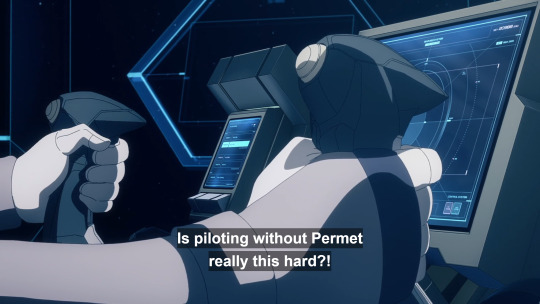
This little aside from Chuchu is so suspicious tbh. Considering Mio's failure at piloting, this seems to imply either she does not have a permet implant of any sort or a flat intolerance. I have a sneaking suspicion it'll become a factor in the next episode.

Mio staring wistfully at Cool-san/etc memento of Suletta will always grab me by the throat. Girl wants to wife up Suletta so bad. And really, who could blame her?
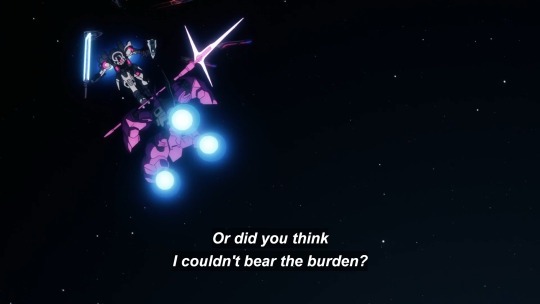
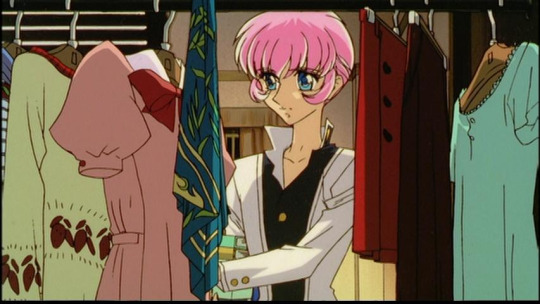
Schwarzette is so pretty and cool. Unfairly so. Like, why did you make that thing so unique and cool? For dipstick Lauda?? Who is that pink permet for and why does it look like Utena??? ANSWER ME OKOUCHI
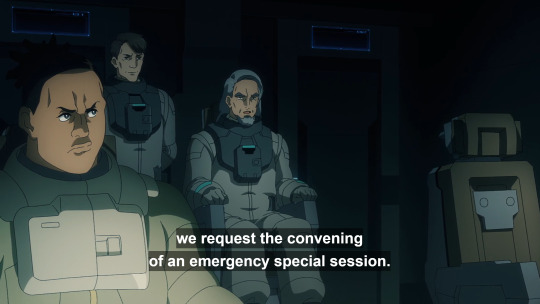
That's nice of Delling to rise from his sickbed to try and negotiate with the SAL. Unfortunately, this would be for naught because they're here to purge and replace. Not make nice. It was the thought that counts, I suppose.
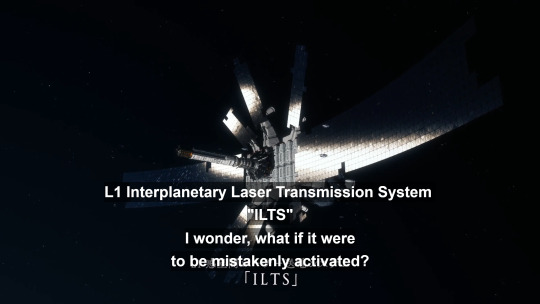
Speaking of, the debut of a solar ray blindsided me. I mean, yeah it's Gundam, but I kinda thought we were skipping the big death ray lmao. After sitting on it, I think I know where it's headed. Totally on brand for SAL too in hindsight. They like to act removed, but they're just as entrenched as Benerit in the skeevy corpo politics. Allying with Ochs and now Peil cements it

Check the link above to see my Utena related thoughts on this moment btw. It might be the highlight of the episode beyond the Prospera confrontation. Stunned they finally stopped playing coy and seemingly confirm Notrette is indeed a GUND entity residing in pseudo hell, and likely a GWitch newtype like Eri


This was very sweet and I enjoy it more on a rewatch but I also understand why I and so many people had a gut-deep aversion to this subplot. The issue is entirely investment based imo, and tbh I just don't care that much about the Jeturk family dynamics. At best, I don't mind them. Guel is a bro but Lauda is SO exhausting on multiple levels. His misogyny and gross negligence of Petra in favor of revenge doesn't help.
If something came of this other than Lauda/Guel sibling closure, I'd consider it fulfilling. But if you lack investment in the conflict, it's going to feel limp or frustrating in comparison to the siblings you want to see. So while I appreciate the parallel with Suletta/Eri and the continuing subtext of witch coded Mio, that's it for me. But hey, it serves a purpose. A tragic cycle was broken after all, thanks to love and MVP Felsi!

The one big gripe I have after consideration is this man's continued existence. Kenanji doesn't deserve to play buddy buddy with the cast. He's a dirty space cop who bullies children and murdered Nadim, now he's joking with 5lan? The hell. I get the theme of the show is forgiveness and not perpetuating the cycle of revenge but... really? KENANJI gets to be happy but Norea/Sophie don't? Sigh

It was so dirty of Eri to use Suletta's love for Mio against her. She knows Suletta would panic over their mother possibly 'gaining two'. It's crafty and unrepentant, but Suletta holds fast. Her faith in Mio is greater than her idle fears
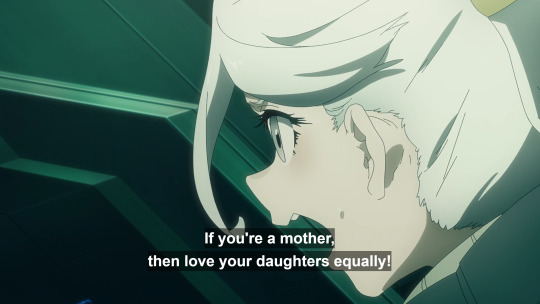
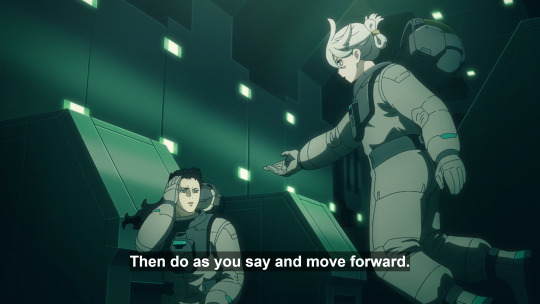
Mio scolding Prospera over her favoritism was great. We love a fiancé willing to take a stand against her shit in-laws. Speaking of, looks like Mio has fully embraced becoming a Mercury one day. 'All of us will be family' YEAH YOU WILL so suck it up Prospera. The holidays are gonna be so awkward
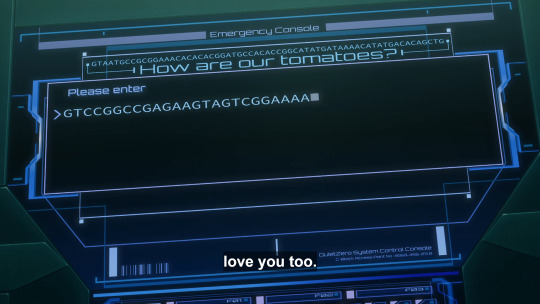
Btw love Mio was shouting at her while having an emotional breakthrough deciphering her mother's QZ riddle. This moment was excellent and easily superceded my minor gripes. UGH when will you reveal Notrette's whole deal GWitch? We're waiting

Such a bittersweet moment. We know from the Blessing and Cradle Planet that Eri loves her sister but it may not have been until this moment that Suletta understands her feelings. Now, I don't think she's 'dead' tbh. Or deader anyway. I suspect it's a false flag to hook you until the finale. It would be quite anti-climactic if she passed without a proper goodbye. I'm still holding out on a Tempest end where Prospera voluntarily sets her free.
The next Sunday will be our last. Hard to believe tbh. Feels like just yesterday we set out on this spectacular journey. Que sera sera! I'll see y'all in the finale~
#Wish Eri had the endcard tbh but oh well#maybe they're saving it for the end#g witch#g witch spoilers#suletta mercury#miorine rembran#gundam witch from mercury#sulemio#prospera mercury#ericht samaya#guel jeturk#lauda neill#g witch episode 23
132 notes
·
View notes
Text
Something stupid...
I recently rewatched tmnt 2012 and thought... wow, there's loads of fully rendered and designed shops in the background. Has anyone ever listed them all for reference?
I didn't even check the fandom wikia so maybe someone has. But hey ho. I've done it now.
So here's all the shops and comics shown in the TMNT 2012 series, for your reference fellow writers and other insane people.
.
Comic books seen throughout the series:
'From the Sewer' (S1 E1, 08:09)
'Martial Pain' (S1 E4, 09:00)
'Famous Creatures of […] Town' (S1 E7, 22:49) **couldn't make out one of the words, sorry!
'Corps Cadares: The Dead Will Save the Earth' (S1 E11, 04:08)
'The Timely Times' (S1 E20, 09:43)
'Diabolical Dead' (S1 E20, 09:43)
'Barbarian' (S1 E20, 09:43)
'Space Heroes' (S1 E23, 10:08) -- Leo collects.
'Tales from the Cosmos' (S2 E2, 00:46)
'Dude' (S2 E4, 10:04)
'Modern Ninja Magazine' (S2 E7, 00:50) --Raph collects.
'Shock Techno' (S2 E10, 00:19)
'Weekly Weird News' (S2 E14, 28:17)
'Green with Envy' (S2 E16, 10:17)
'Split' (S3 E5, 05:45)
'Wingnut' (S4 E19, 00:12)
'Arachnid Man' (S4 E19, 00:27)
'Superb Man' (verbal, not physically shown- S4 E19, 00:29)
'Fantastic Four Food Groups' (S4 E19, 00:31) --heavily associated with Raph.
'Dracula's Castle' (S5 E17, 07:19) -- heavily associated with Mikey.
'Vampire Hunter' (S5 E17, 07:18) --heavily associated with Mikey.
.
Shops seen throughout the series: Book Store (S1 E1, 10:28)
Second Time About (S1 E1, 13:21) -- April stayed with her Aunt above this shop.
Vlad's Repo Depot (S1 E1, 19:31)
Kingfisher Antique/Rare Buy.Sell Jewelry (S1 E1, 21:30)
Fortune Cookie (S1 E3, 14:32) --Purple Dragon base
Rock Bottom Boxing Club (S1 E4, 10:27)
Old Chinatown Tattoo Company (S1 E4, 10:27)
Downtown Athletic Club (S1 E4, 16:08)
Futua-noid Electronics (S1 E5, 17:38)
Pet Supplies (S1 E5, 17:38) -- right next to an alleyway, so I would guess that this the pet store the turtles were bought from.
Mad Wax Records (S1 E5, 17:46)
Everything Store (S1 E5, 17:47)
Dim Sum Then Sum (S1 E7, 12:24)
Laundromat (S1 E7, 13:03)
The Olympia Diner (S1 E8, 02:35)
Tidal Wave Fresh Fish (S1 E8 09:24)
Balzac Chateau du Beuf (S1 E9, 00:32)
Pocket full of Rosies (S1 E9, 00:43)
Wolf Hotel (S1 E9, 13:48) --first met Shredder.
Chinese Herbs and Health (S1 E10, 15:28)
Antonio's Pizza-Rama (S1 E13, 04:53)
Produce City (S1 E16)
(Closed down) Maramba … Shop (S1 E14, 00:35)
Chilly Chillkins Refrigeration company (S1 E14, 21:03)
Roosevelt High School (S1 E15, 09:05)
Comics (S1 E15, 09:05)
Worldwide Genome Project (WGP) (S1 E15, 15:13) --used as Kraang base.
Sweet Dreams Ice Cream (S1 E17 00:27)
Madam Alahazam Fortune Teller (S1 E17 00:27)
Wam-Bam-Pow Comics (S1 E17 00:25)
D.W Yatt Apothecary Est.1875 (S1 E16)
Magic Middleton's Tricks and Costumes (S1 E21, 13:09)
Ziga's Transmission Allignment Collision Tune-Up Autobody (S1 E24, 11:46) --used as Kraang base.
Argosy Theatre (S2 E1, 01:19)
Newstand (S2 E4, 10:04)
Midtown Ice Rink (S2 E6, 06:29)
Barber Shop (S2 E8, 00:11)
Lox Schmear & Java (S2 E19, 17:21)
Bernie's General (S3 E5, 04:44)
Comet Cleaners (S3 E11, 03:29)
Play Pier (S3 E11, 09:03)
Auman Chemicals (S3 E14, 14:53)
Channel 6 (S4 E10, 07:40)
AMAS: Allied Martial Arts Supply (S4 E15, 13:24) -- Used to hold Shredder/Foot Clan's weapons.
Cowabunga Skates (S4 E17, 05:20)
Run Jump Kick (S4 E17, 05:20)
Dell Abate Ristorante (S4 E18, 06:25) -- Don Vizioso's restaurant.
Felipe's (S4 E18, 16:27)
Hicnight Hotel (S4 E18, 17:16) --Don Vizioso's base.
Mini Mart (S5 E3, 16:19)
Friendly Jack's Loans (S5 E3, 17:43)
Wan Dingo's House of Curiosities and Oddities (S5 E5, 13:28)
Shanghai Sternn's Stir Fry (S5 E10, 12:04)
.
Notes:
The episode timestamps might not be totally accurate since I was watching this on a... ahem... legal website.
The timestamps are from when you could clearly and obviously see the shop signs. Like, Ziga's is visible from like episode one but couldn't be clearly read.
Some of the comics were just in shop windows and not really associated with a character so be careful. That is not a list of every comic the turtles have read. Like the Timely Times has only been in the background, not read by a particular turtle.
There were LOADS of shops where the shop name was in Chinese (or Japanese, I don't know) and so I couldn't list. Most of the shops by the Chinatown arch weren't in english. That's why even Murakami's shop isn't listed here. Because the actual shop name wasn't in english.
Thanks for reading through this. Hopefully this was useful for... anyone out there.
34 notes
·
View notes
Text
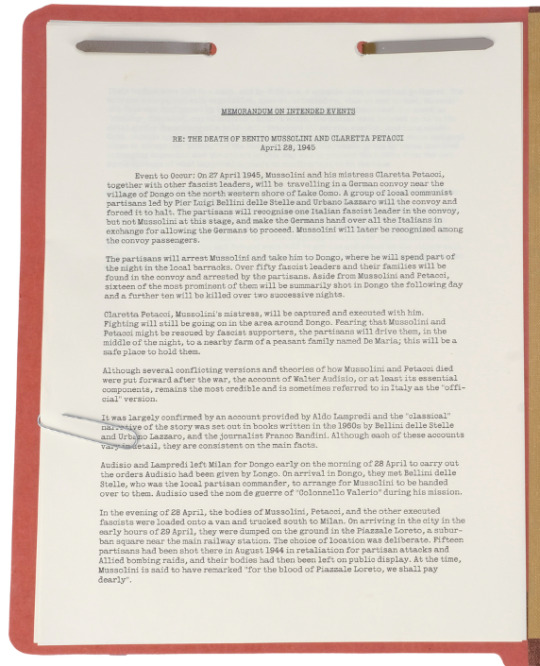


another of Five's cases while working as management for the Commission was the execution of Benito Mussolini and his mistress Claretta Petacci - Mussolini was the dictator of Italy in the 1940s and entered Italy into WWII on the side of the Nazi's. Italy was pretty pissed about this and started a resistance against him.
transcript:
MEMORANDUM ON INTENDED EVENTS RE: THE DEATH OF BENITO MUSSOLINI AND CLARETTA PETACCI April 28, 1945 Event to Occur: On 27 April 1945, Mussolini and his mistress Claretta Petacci, together with other fascist leaders, will be travelling in a German convoy near the village of Dongo on the north westen shore of Lake Como. A group of local communist partisans led by Pier Luigi Bellini delle Stelle and Urbano Lazzaro will the convoy and forced it to halt. The partisans will recognise one Italian fascist leader in the convoy, but not Mussolini at this stage, and make the Germans hand over all the Italians in exchange for allowing the Germands to proceed. Mussolini will later be recognized among the convoy passengers. The partisans will arrest Mussolini and take him to Dongo, where he will spend part of the night in the local barracks. Over fifty fascist leaders and their families will be found in the convoy and arrested by the partisans. Aside from Mussolini and Petacci, sixteen of the most prominent of them will be summarily shot in Dongo the following day and a further ten will be killed over two successive nights. Claretta Petacci, Mussolini's mistress, will be captured and executed with him. Fighting will still be going on in the area around Dongo. Fearing that Mussolini and Petacci might be rescued by fascist supporters, the partisans will drive them, in the middle of the night, to a nearby farm of a peasant family named De Maria; this will be a safe place to hold them. Although several conflicting versions and theories of how Mussolini and Petacci died were put forward after the wat, the account of Walter Audisio, or at least is essential components, remains the most credible and id sometimes referred to in Italy as the "official" version. It was largely confirmed by an account provided by Aldo Lampredi and the "classical" narrative of the story was set out in books written in the 1960s by Bellini delle Stelle and Urbano Lazzaro, and the journalist Franco Bandini. Although each of thses accounts vary in detail, they are consistent on the main facts. Audisio and Lampredi left Milan for Dongo early on the morning of 28 April to carry out the orders Audisio had been given by Longo. On arrival in Dongo, they met Bellini delle Stelle, who was the local partisan commander, to arrange for Mussolini to be handed over to them. Audisio used the nom de guerre of "Colonnello Valerio" during his mission. In the evening of 28 April, the bodies of Mussolini, Petacci, and the other executed fascists were loaded onto a van and trucked south to Milan. On arriving in the city in the early hours of 29 April, they were dumped on the ground in the Piazzale Loreto, a suburban square near the main railway station. The choice of location was deliberate. Fifteen partisans had been shot there in August 1944 in retaliation for partisan attacks and Allied bombing raids, and their bodies had then been left on public display. At the time Mussolini is said to have remarked "for the blood of Piazzale Loreto, we shall pay dearly".
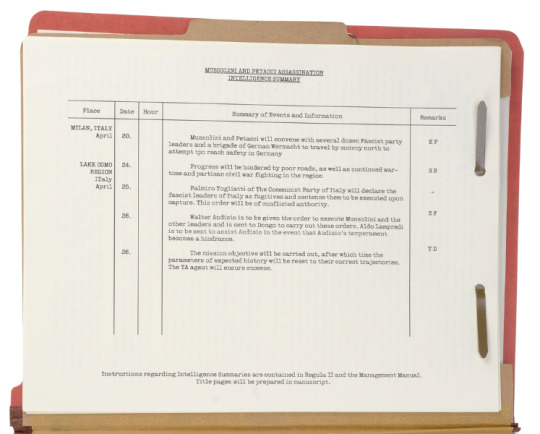
MUSSOLINI AND PETACCI ASSASSINATION INTELLIGENCE SUMMARY Place | Date | Hour | Summary of Events and Information | Remarks MILAN, ITALY April | 20. | Mussolini and Petacci will convene with several dozen Fascist party leaders and a brigade of German Wermacht to travel by convoy north to attempt to reach safety in Germany | EF LAKE COMO REGION ITaly April | 24. | Progress will be hindered by poor roads, as well as continued war-time and partisan civil war fighting in the region | SB 25. | Palmiro Togliatti of The Communist Party of Italy will declare the fascist leaders of Italy as fugitives and sentence them to be executed upon capture. This order will be of conflicted authority. | - 26. | Walter Audisio is to be given the order to execute Mussolini and the other leaders and is sent to Dongo to carry out these orders. Aldo Lampredi is to be sent to assist Audisio in the event that Audisio's temperament becomes a hinderance. | EF 26. | The mission objective will be carried out, after which time the parameters of expected history will be reset to their correct trajectories. The TA agent will ensure success. | TD Instructions regarding Intelligence Summaries are contained in Regula II and the Management Manual. Title pafes will be prepared in manuscript.
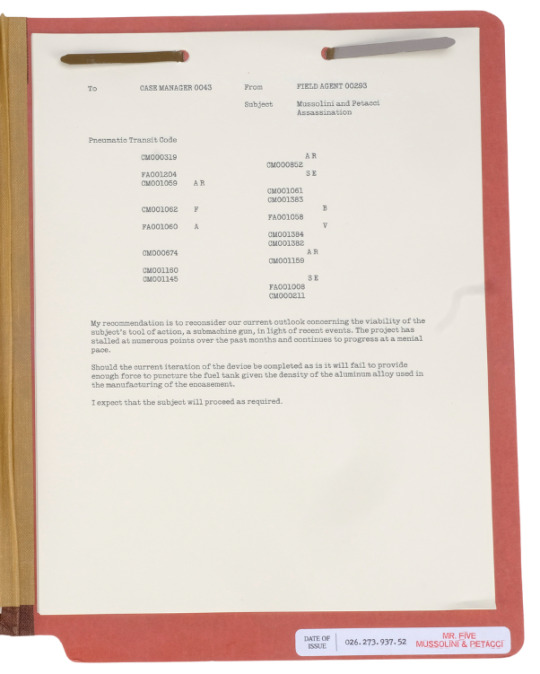
To CASE MANAGER 0043 From FIELD AGENT 00293 Subject Mussolini and Petacci Assassination Pneumatic Transit Code [multiple strongs of number as seen in the image above] My recommendation is to reconsider our current outlook concerning the viability of the subject's tool of action, a submachine gun, in light of recent events. The project has stalled at numerous points over the past months and contines to progress at a menial pace. Should the current iteration of the device be completed as is it will fail to provide enough force to puncture the fuel tank given the density of the aluminum alloy used in the manufacturing of the encasement. I expect that the subject will proceed as required.
15 notes
·
View notes